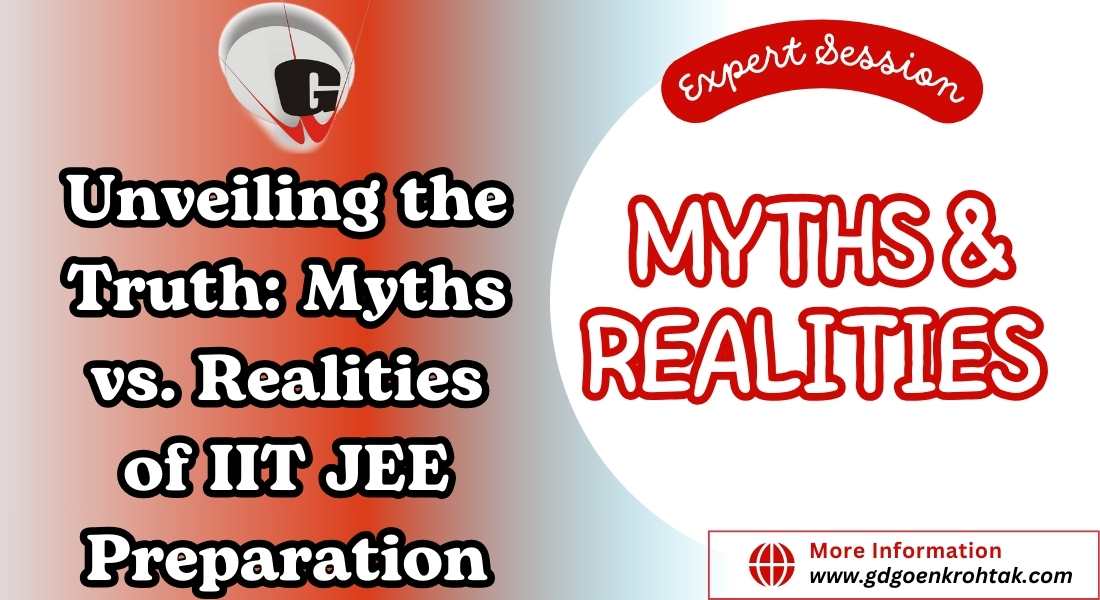Preparing for the Indian Institute of Technology Joint Entrance Examination (IIT JEE) is a formidable challenge that millions of students undertake each year. However, there are several myths and misconceptions surrounding IIT-JEE preparation process that can mislead and demotivate students on their path to success. In this blog post, educators at GD Goenka International School, Rohtak aim to debunk these common myths and provide clarity for aspiring IIT JEE candidates.
Myth 1: Only Geniuses Can Crack IIT JEE
Reality: Not just people with exceptionally high IQs can succeed in the IIT JEE. Strong conceptual understanding and analytical abilities are important, but constant effort, commitment, and efficient study techniques are more important. Many students who had difficulty with the subjects at first have succeeded in the exam by being persistent and using effective study strategies.
Myth 2: You Need to Study 12-16 Hours a Day
Reality: Quality trumps quantity when it comes to IIT JEE preparation. While hard work is important, it alone cannot guarantee success in the IIT JEE. A balanced approach combining smart studying techniques with consistent effort is essential. Understanding concepts thoroughly and practicing regularly will greatly enhance your chances of success.
Myth 3: Coaching Institutes Are Mandatory for Success
Reality: Joining a coaching institute can be beneficial, but it is not mandatory for cracking the IIT JEE. Many successful candidates have achieved their goals through self-study or online resources, textbooks and practice papers. It ultimately depends on your learning style and discipline to stay focused and motivated throughout the preparation journey.
Myth 4: Must Sacrifice All Extracurricular Activities
Reality: Though preparing for IIT JEE demands commitment, it does not imply giving up on extracurricular activities entirely. As a matter of fact, hobbies and exercise can really boost productivity by reducing stress and provide the essential pauses. Balancing studies with leisure activities helps maintain mental and emotional well-being.
Myth 5: Starting Early Is Necessary to Succeed
Reality: While starting early gives you an advantage, it does not guarantee success on its own. What matters more is consistent effort and effective time management during the entire preparation period. Even if you begin later, with proper planning and dedication, you can still achieve excellent results.
Myth 6: Memorization is the Key
Memorization or rote learning are ineffective for preparing for the IIT JEE. The exam’s main objectives are to assess conceptual comprehension and problem-solving skills. It’s essential to grasp the underlying principles of subjects and practice applying them in different scenarios.
Myth 7: Studying From Multiple Books is Better
Reality: Overuse of reference materials might result in information overload and misunderstanding. Rather, confine yourself to only a few well recommended books and study guides. Before tackling other topics, concentrate on fully grasping the information contained in these resources. Standard IIT JEE preparation materials should be used in addition to NCERT textbooks as a good place to start.
Myth 8: Last-Minute Cramming Can Help You Succeed
Reality: It is not a good idea to study for the IIT JEE at the last minute. It will take a sustained period of constant effort to prepare for this exam. Success requires laying a solid basis, practicing frequently, and revising. While cramming may aid in short-term memory, it doesn’t promote in-depth knowledge of the subjects.
Conclusion
Debunking common myths regarding IIT JEE preparation is essential for students to approach their studies with confidence and clarity. Students who understand that success is not solely dependent on IQ or long study sessions can develop efficient study techniques, uphold a positive work-life equilibrium, and persevere through the preparation process. Succeeding in the IIT JEE exam requires adopting a realistic mentality, making good use of resources, and maintaining focus on long-term objectives.


